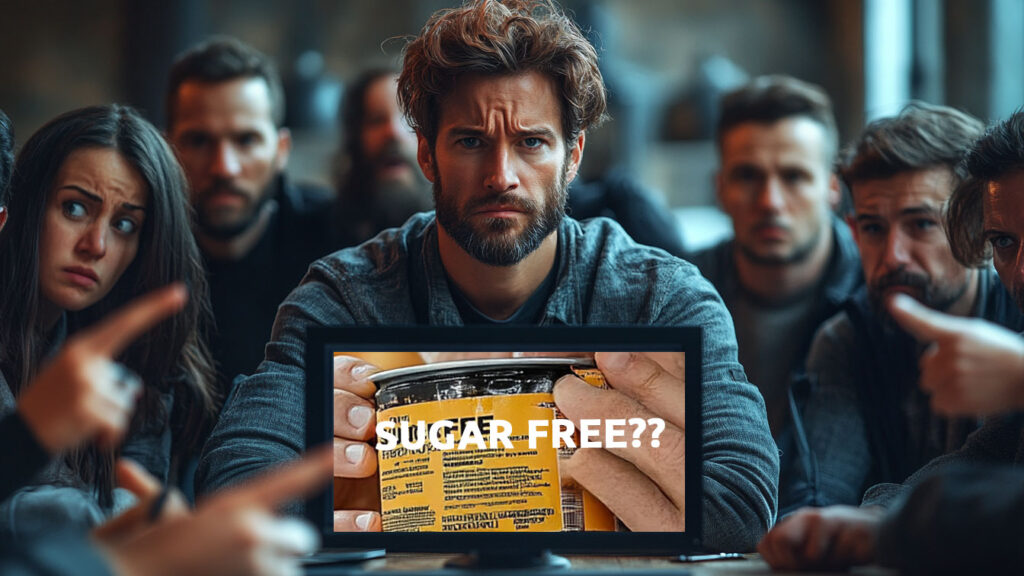Snippet
Marketing shapes our food choices, but is it always to blame? From misleading labels like “no added sugars” to strategic placement of unhealthy snacks, its influence is undeniable. Yet, the same tools can drive healthier habits. Awareness is key—every choice counts!
Marketing and nutrition: exploring its dual role as a driver of health and misinformation
I’ve just finished reading The Glucose Revolution by Jessie Inchauspé, an eye-opening book offering practical advice for managing glucose spikes and improving overall well-being. From strategies like eating foods in the right order to engaging in small movements after meals, I found plenty of useful tips to apply in daily life.
However, what struck me most was the author’s focus on the deceptive role of marketing, accused of being one of the primary culprits of misinformation in the food industry.
Food and marketing: misinformation
Advertising for unhealthy foods targeted at younger audiences is pervasive and employs a wide range of tools.
One example of misinformation is products labeled as “no added sugars.” In the book, the author explains how this label is often misleading, making consumers believe the product is healthy or low in sugar. Many of these foods contain naturally occurring sugars or other sweeteners disguised under less recognizable names like glucose syrup, fructose, or maltodextrin. These ingredients still significantly impact blood sugar levels, but marketing presents them as harmless alternatives.
Inchauspé explains that when we see “no added sugars” on a label, our brain interprets it as a health promise, but it’s often just a semantic trick. Hidden sugars are there, ready to cause glucose spikes.
This example highlights how marketing can confuse consumers, leading them to make choices that, instead of improving their health, perpetuate unhealthy eating habits.
When advertising messages can turn unhealthy foods into seemingly ideal choices, food marketing stands out as a force that heavily influences many people’s decisions. But is marketing really to blame entirely? Could this powerful tool be used to promote better health?
Food marketing: a force for good or bad?
In recent decades, food marketing has become one of the most powerful forces shaping people’s eating habits. Often accused of promoting unhealthy foods and contributing to the rise of metabolic diseases like obesity and diabetes, food marketing frequently finds itself at the center of heated debates.
Is marketing entirely to blame for our overconsumption of harmful foods? Or could this persuasive force be transformed into a weapon for good?


Marketing: a deserved accusation?
Marketing is a tool; the problem lies in how it’s used.
Food marketing often employs strategies to persuade consumers to choose one product over another, sometimes disregarding the health implications. Some critical points include:
- Misleading packaging and messaging
Producers exploit terms like “no added sugars” or “organic” to make their products seem healthy. However, these foods are often packed with hidden sugars or unhealthy fats. The label “no added sugars” doesn’t mean a product is healthy, and in many cases, the harm is hidden under other names such as glucose syrup, fructose, or maltodextrins. - Aggressive promotion of ultra-processed foods
Sweet snacks, sugary drinks, and ready-made meals dominate advertising spaces. These products are designed to be irresistible, thanks to a combination of sugars, salt, and fats. Ultra-processed foods are engineered to grab our attention, stimulate our brains, and create addiction. Marketing is their mega phone. - Targeting children
Marketing directed at younger audiences, through TV ads, influencers, or appealing mascots, shapes their food preferences. Children are ideal victims. They grow up believing that sugary snacks are normal, and that drinking soda is a routine. - Strategic placement for impulse purchases
Candy, chocolate bars, and other sugar-laden products are often placed strategically in supermarkets and stores, like near checkouts or entrances. This placement is no accident; it’s a strategy designed to exploit consumer psychology and encourage impulse purchases, especially during moments of waiting.
This technique particularly affects children, who see these products as an immediate and irresistible “reward,” and adults, who often give in to temptation due to the ease and availability of these items. Even when aware of the risks associated with consuming these foods, their strategic placement significantly increases the likelihood of purchasing them, making it hard to resist.

The limits of marketing
Despite marketing’s significant impact, blaming it entirely for the food problem would be a mistake. Other factors come into play:
- Lack of nutritional education
Many people don’t know how to correctly interpret nutritional labels or identify truly healthy foods. Without a solid educational foundation, resisting the persuasive power of advertising is challenging. - Economic accessibility
Ultra-processed foods are often cheaper and more accessible than fresh fruits, vegetables, and proteins. When healthy and fresh food costs more than a chocolate bar, something is wrong with the system. - Hectic lifestyles
Work, commitments, and busy schedules push many people toward quick and practical solutions, often represented by ready-made or ultra-processed foods. The lack of time to cook and plan meals makes these products an attractive alternative, even at the expense of nutritional quality. This eating habit is not solely a consequence of marketing but also of a social model that prioritizes speed over health.
The positive side of marketing: a transformative force
Marketing is not inherently negative. The same techniques used to promote unhealthy foods can be employed to encourage healthier choices.
Examples of success include:
- Educational campaigns
Ads and initiatives promoting the consumption of fruits, vegetables, and whole foods are gaining traction. If marketing brought us into chaos, it can also lead us out. - Collaborations with brands
Some companies have started reformulating their products, reducing sugars and fats, to meet the demands of a health-conscious market. - Stricter regulations
Governments and international organizations are imposing restrictions on the marketing of unhealthy foods, especially toward children. These measures can push the industry toward more ethical strategies.

Technology and transparency: tools like yuka as allies
In this context, apps like Yuka offer a powerful tool for informed consumers. These apps allow users to scan product barcodes and receive a clear evaluation based on ingredients, nutritional content, and the presence of additives.
For example, Yuka assigns scores to products, explaining the reasons for the rating in simple terms and suggesting healthier alternatives when needed. This transparent approach helps consumers overcome the confusion caused by marketing and make better-informed choices.
Knowledge is power. Understanding what’s really in the food we put in our carts is the first step to improving our health from a nutritional perspective.
While fresh, unprocessed foods should always be preferred, when forced to choose ready-made items, these apps can serve as a valuable guide to finding better options and minimizing health impacts. Thanks to tools like Yuka, we can return control to consumers, reduce the impact of deceptive marketing, and encourage healthier eating habits.
Shared responsibility
Marketing has played a key role in creating a food environment that prioritizes unhealthy choices, but it’s not the sole culprit. Solving the issue requires an integrated approach involving:
- Nutritional education in schools and for adults.
- Economic incentives to make healthy foods more accessible.
- Private sector commitment to promoting healthier options.
- Stricter regulations on food marketing.
- Disincentives for harmful foods.
Marketing can be a force for positive change when guided by ethical principles, supported by informed individual choices, and effective public policies.
Do your part
From victims of deceptive marketing, we all can become ambassadors of a healthier lifestyle that includes physical activity, proper nutrition, and positive social relationships.
The food choices we make daily have a direct impact on our health and well-being.
We can start with small steps, like carefully reading labels, using apps like Yuka to make more informed decisions, and choosing fresh, unprocessed foods whenever possible. Share this information with friends and family, discuss the topic, and help spread greater awareness. Changing our habits might seem challenging, but with the right tools and mindset, every step counts

